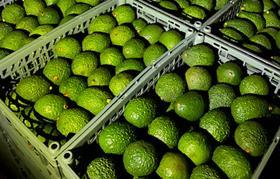
European importers have taken delivery of the first trial shipments of Hass avocados from Ethiopia.
Durabilis, the international impact investment firm behind the venture, described the news as “a game-changing milestone that demonstrates the huge potential for Ethiopian produce”.
The fruit was grown in the Koga region, south of Bahir Dar, and shipped via the new Ethiopia-Djibouti-Europe cool logistics corridor, being transported first by train to the Port of Djibouti, then shipped to Italy and transported to the UK by truck.
According to Durabilis, which also owns Belgian importer FairFruit, the landmark consignment presents buyers across the UK and Europe with a new window of availability for competitively-priced Hass avocados from mid-September to mid-October. It also paves the way for a whole new range of produce exports from Ethiopia.
The first 22.4-tonne consignment arrived in the UK on 20 September, followed by a second shipment on 5 October 2020.
The vast majority of the GlobalGAP-certified fruit has been sold to two leading importers who mainly serve UK retailers, with volumes being offered to customers in Belgium and the Netherlands. Separately, two trial airfreight shipments have been made to the UAE and Saudi Arabia.
“Considering the agricultural potential of Ethiopia, this successful test with avocados creates a whole new perspective for a series of Ethiopian products that qualify for export to Europe,” said Durabilis CEO Evert Wulfrank.
The 750km refrigerated railway connection from Modjo Dry Port in Ethiopia to the Port of Djibouti offers a regular, reliable service lasting 30 hours, compared with two-to-three days by truck.
It means the transit time from Ethiopia to Europe is now less than 30 days, with potential to reduce that to 24 days in the future.
“This is important for buyers that are looking for new and competitive sources of fresh fruit and vegetables, and who, so far, have disregarded Ethiopia as a feasible option because the country lacked seafreight connections,” Wulfrank continued.
“We are looking for more avocado buyers in the UK, Europe and the Middle East because our projected production volumes will grow substantially and we will have a range of sizes.”
Ethiopia has considerable agricultural potential thanks to its fertile soils, a temperate climate, competitive labour costs, and plenty of available water within the Koga region (south of Bahir Dar) where Durabilis is working with smallholder growers in conjunction with its local subsidiary Koga Veg Agricultural Development.
The Hass avocado season in the Koga region runs from mid-September to mid-October, while in the south of Ethiopia, production runs from January to June. Durabilis said investigations are also ongoing in other parts of the country to assess the potential for almost year-round production.
Wulfrank commented: “Ethiopia has all the ingredients to become an important supplier of fresh fruits and veggies to Europe. The country needs companies who can pave the way for the sector by demonstrating this potential, and by creating demand for logistical services and for agricultural inputs to enable the local supporting sector to develop. We would like to be one of those companies generating opportunities for Ethiopia.”
Jan Michielsen, general manager of Durabilis-owned Koga Veg in Ethiopia added: “Durabilis and Koga Veg are considered to be a pioneer of shipping perishables by container from Ethiopia since we trialled a container of peas in 2015 and a container of avocados in 2019.
“As such, the organisations behind the Ethiopia-Djibouti-Europe cool logistics corridor reached out to us to identify bottlenecks in Ethiopia’s logistics chain.”
Michielsen said the company’s primary focus is to establish a commercially-viable business model; sourcing from smallholder avocado growers and supplying their fruit to the international market via a reliable logistics link.
“Already, those growers have adopted environmentally-friendly production methods that meet the quality requirements for the ready-to-eat sector in Europe, for which they receive a fair price,” he said.
“In the future, we’d like to invest further in more sustainable methods, efficient water usage, and, ultimately, in organic-certified production.”
Enjoyed this free article from Eurofruit Magazine and its team of editors? Don’t miss out on even more in-depth analysis, plus all the latest news from the fresh produce business. Subscribe now toEurofruit Magazine.



